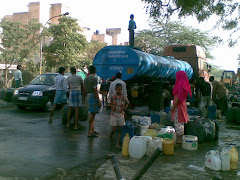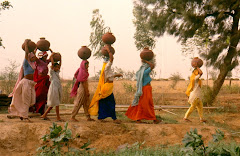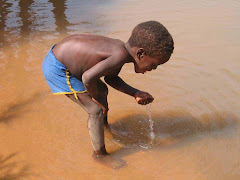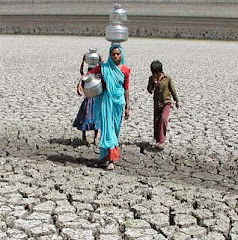Water scarcity is giving rise to conflicts. Among people, within nations and between nations. At places, these conflicts are leading to growing instability among people. As is evident in the Middle East.
But, a leading expert in water resource policy and conflict resolution says though conflicts over water are at the heart of regional instability, they could become catalyst for cooperation and peace, if managed properly.
There is a growing tendency to cooperate over water even though politicians have threatened to take to the battlefield over the precious resource, he added. "Two thirds of the time we do anything over shared water, we cooperate. That is hugely important," said Programme Director in Water Conflict Management and Transformation at Oregon State University, Aaron Wolfe.
He feels that water turfs just lead to mere posturing by politicians of all hues. The last formal war over water was fought in 2,500 B.C. between two Sumerian city-states contesting the Tigris basin, he said recently at the United Nations General Assembly.
The problem, he says, is that water is often managed unilaterally and thus inefficiently, and is used to exacerbate tensions. Water itself did not respect political boundaries, but governments used man-made borders to protect their sovereignty, economies and nationalities.
Also, policy discussions over water issues focused too much on global trends and solutions, while neglecting the regional and sub-regional water disputes that were a real security concern, responsible for poverty, disease and degradation in many parts of the world.
His comments come as a whiff of fresh air after reports and comments, including the United Nations, warning that water stress, amplified by climate change, was likely to pose a mounting security challenge in the years to come.
The struggle for water could threaten fragile states and drive regional rivalry, the UN had warned in the third edition of World Water Development Report, entitled 'Water in a changing world', which was released during the World Water Forum at Istanbul in March 2009.
More than 1 billion people lack access to safe drinking water and 2.4 billion, or about half the world’s population, has no access to basic sanitation.
Every year, water-related ailments make some 250 million people sick and claim the lives of 2.2-5 million more. These statistics provide a powder keg good enough to explode and divide a humanity already divided. But, would the misery and pain by chance bring us together?
Showing posts with label water scarcity. Show all posts
Showing posts with label water scarcity. Show all posts
Wednesday, November 25, 2009
Saturday, October 10, 2009
Look beyond innovations to tackle water shortages
Global water issues are becoming complex and experts now feel that tackling them would require some out-of-box thinking. Innovations are not enough where water scarcity is concerned and an effective solution to the water problem will involve a business model, creative packaging and a reasonable price, former technology officer of General Electric Water and Process Technologies Ramesh Rengarajan said.
Rengarajan said the requirement was to find solutions that married water sustainability with efficiency. He proposed treatment and reuse of water through a decentralized power system as one solution for water scarcity that may minimize environmental impacts. His comments came during an interactive session at the Massachusetts Institute of Technology in late August.
The former GE official said he saw the treatment and reuse of water as a solution for the growing water shortages across regions. While this "toilet-to-tap" method makes some people uneasy, it has been widely used with no harmful effects.
He said he envisioned a device people could plug in and use on-site, like an air conditioner, to disinfect water. The solution would have to be cost-effective in order to work. While people are willing to pay for gas and oil, they are reluctant to do so for water, he added.
According to Rengarajan, finding a solution to global water scarcity was 'not a challenge, but an opportunity'. A solution would benefit the environment and potentially create a multibillion-dollar business, he added.
Against a backdrop of growing water scarcity around the world, any business that promises a solution would indeed be worthwhile. The last several years have seen advancement in technology solutions including new and efficient ways to desaline, reuse and treat water. Now, water is even being made from mist, or out of air. Going ahead, all of these would become still more efficient and effective, and hopefully, some new solutions would arrive.
Rengarajan said the requirement was to find solutions that married water sustainability with efficiency. He proposed treatment and reuse of water through a decentralized power system as one solution for water scarcity that may minimize environmental impacts. His comments came during an interactive session at the Massachusetts Institute of Technology in late August.
The former GE official said he saw the treatment and reuse of water as a solution for the growing water shortages across regions. While this "toilet-to-tap" method makes some people uneasy, it has been widely used with no harmful effects.
He said he envisioned a device people could plug in and use on-site, like an air conditioner, to disinfect water. The solution would have to be cost-effective in order to work. While people are willing to pay for gas and oil, they are reluctant to do so for water, he added.
According to Rengarajan, finding a solution to global water scarcity was 'not a challenge, but an opportunity'. A solution would benefit the environment and potentially create a multibillion-dollar business, he added.
Against a backdrop of growing water scarcity around the world, any business that promises a solution would indeed be worthwhile. The last several years have seen advancement in technology solutions including new and efficient ways to desaline, reuse and treat water. Now, water is even being made from mist, or out of air. Going ahead, all of these would become still more efficient and effective, and hopefully, some new solutions would arrive.
Labels:
water reuse,
water scarcity,
water treatment
Subscribe to:
Posts (Atom)

.jpg)


